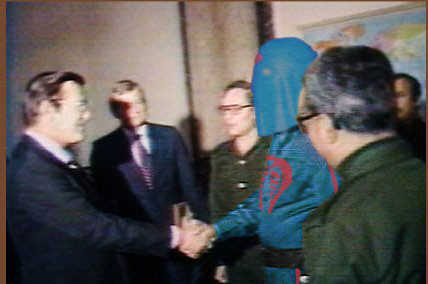
I had conversation with a friend over lunch last week that got me thinking about how the word 'evil-doer,' specifically how use of the word has become more common in foreign policy discussions. This friend has been working for Program Executive Officer Soldier since he finished undergrad in 2005. He had limited exposure to politics or history as an accounting major, so he was picking my brain about the 'surge' and the War on Terror more broadly.
It is difficult to discuss U.S. foreign policy towards the Near East in the abstract, so before delving into my views, I asked him about how much he knew about the region. Not surprisingly, his response was 'very little,' so I refined my question to 'Do you know why a guy like OBL is a terrorist'? The response to that was 'He hates America and wants to take over the Near East. I don't know why he uses terrorism though. Evil is kind of hard to understand.'
At this point, I gave him a 20 minute primer on the origins of linkage between Islamic fundamentalism and grand terrorism -- starting from Sayyid Qutb's Milestones to today. He was particularly surprised to hear that even though Osama bin Laden and Saddam are not explicitly linked, al Qaeda's existence and mission are deeply intertwined with the 1991 Persian Gulf War and its aftermath.
[Explainer: Part of bin Laden's hatred towards the Saudi royal family comes from the fact that they chose American support over his offer to wage an Afghan-style guerrilla war in defense of Kuwait. Bin Laden's 1996 fatwah states that the presence of U.S. troops on Saudi soil as an affront to Islam. It also claims that the U.S. is culpable for the deaths of the millions of Iraqi children due to sanctions.]
We need to move away from terms like 'evil-doer' because they allow people to paper over the murky elements of politics and war. We're not facing-off against an opaque, cartoonish foe, such as Cobra Commander or Skeletor. Bin Laden and his ilk more like Tony Soprano or even Tony Montana. They ruthlessly pursue a set of fairly clear objectives in a manner that is bounded by their own twisted sense of right and wrong.
After mentioning this conversation to another friend, she suggested that I photoshop Cobra Commander into the photo of Donald Rumsfeld and Saddam Hussein shaking hands in the 1980s.
Update: SG has just been brimming with great ideas. Here is a rough breakdown of what goes into G.I. Joe's definition of the "The Battle":


5 comments:
As the friend who suggested it, I highly approve of the photoshopping.
(Though come to think of it, G.I. Joe never did tell us what the other half of the battle was supposed to be.)
SG - You post inspired me to contemplate what the other half of G.I. Joe's battle is. This is what I've come up with so far:
Constituent pieces of "The Battle"
1. Knowing: 50%
2. Known unknowns: 6%
3. Unknown unknowns: ??
4. Ignoring what you know because it is politically or bureaucratically expedient: 4%
5. Having guns that shoot red lasers: 7%
6. No camoflage, no body armor, no problem!: 3%
7. Ensuring that all of your major weapons systems are built in 20+ Congressional districts: 11%
8. Constantly justifying you actions on dozens of Joint Staff Instructions, DoD Directives and national strategy documents: 9%
The pie chart is forthcoming.
That's a great Photoshop graphic! Good discussion too.
That is the biggest part of the problem we have with creating a strategy- we don't understand what our enemies goals are; our only goal (stop getting blown up) is a negative goal. Without understanding their objectives, we can't build any sort of strategy.
I fear it is already too late to get people to understand this- and this is what is causing us to lose the war on terror. No matter what you think of containment as a strategy, it at least *was* a strategy. At the moment, we have nothing but tactics (and mostly wrong ones at that).
Lol! Brilliant!
Post a Comment